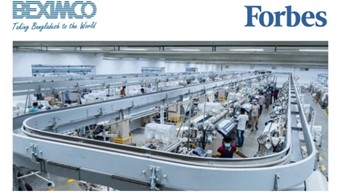Blog
BEXIMCO Textiles: The Rise, Fall, and Renewal of Bangladesh’s Fabric Giant

Introduction

From the industrial heart of Gazipur, BEXIMCO Textiles stands as a symbol of Bangladesh’s ambition in the global textile market. As one of the country’s largest and most technologically advanced textile manufacturers, BEXIMCO has experienced both remarkable growth and serious challenges. Its journey reflects the broader story of Bangladesh’s garment industry from rapid expansion and global partnerships to sustainability efforts and financial struggles.
The Foundation of an Industrial Giant
BEXIMCO, short for Bangladesh Export Import Company Limited, began as a trading business in the 1970s and gradually evolved into a diversified industrial group. The textile division, known as BexTex Ltd., soon became its most significant arm.
Vertical Integration and Self-Sufficiency
Unlike many textile companies that depend on external suppliers, BEXIMCO operates through a fully integrated production process starting from spinning and weaving to dyeing, finishing, and garment manufacturing. This setup allows the company to maintain strict control over quality and delivery times, while reducing costs.
Expansion into Global Markets
By the 1990s and early 2000s, BEXIMCO had positioned itself as a leading exporter. Its capacity to produce both high-end fabrics and finished garments attracted major international buyers, giving Bangladesh an early reputation as a dependable sourcing destination.
A Key Player in Global Fashion Supply Chains
Partnerships with Global Brands
BEXIMCO’s client list includes some of the world’s most recognized retailers such as Zara, H&M, Target, and Marks & Spencer. These partnerships highlight BEXIMCO’s reliability in meeting strict international quality and compliance standards.
Large-Scale Production Capacity
The company’s textile division has the ability to finish nearly 100,000 yards of fabric per day, employing thousands of skilled workers. Its state-of-the-art industrial park in Gazipur integrates multiple stages of production, making it one of South Asia’s most advanced textile operations.
Contribution to the National Economy
BEXIMCO Textiles is a major contributor to Bangladesh’s export earnings. Since the readymade garments (RMG) sector accounts for about 85% of total exports, companies like BEXIMCO play a critical role in generating foreign income and employment.
Innovation and Sustainability Efforts
The Recover™ Recycling Initiative
BEXIMCO partnered with Recover™, a global leader in textile recycling, to create Bangladesh’s largest fabric recycling operation. The project focuses on converting textile waste into reusable fibers, promoting a circular economy and reducing raw material imports.

Traceability through FibreTrace Technology
In collaboration with FibreTrace, BEXIMCO began embedding traceable pigments into fibers, allowing brands and consumers to verify the source and sustainability of each fabric. This advanced traceability system enhances transparency and trust across the supply chain.
Eco-Friendly Production Practices
BEXIMCO has also modernized its dyeing and washing units to minimize water usage and chemical waste. These steps help the company align with global environmental standards and appeal to eco-conscious brands.
The 2024–2025 Crisis: A Sudden Downturn
Global Demand Decline
After the pandemic recovery phase, international clothing demand fell drastically. Major buyers reduced or canceled orders, leaving BEXIMCO with unsold inventory and falling revenues.
Financial Struggles and Factory Closures
Due to liquidity shortages in Bangladesh’s banking sector, it became difficult for BEXIMCO to secure working capital for operations and raw material imports. The company’s large-scale fixed costs became unsustainable, forcing it to temporarily shut down factories and lay off nearly 40,000 workers in Gazipur.
Social and Economic Impact
The closure not only affected employees but also disrupted the local economy dependent on the factory. It raised national concerns about the vulnerability of Bangladesh’s export-dependent industries.
Government and Industry Response
Government Intervention and Support
The Bangladesh Government initiated discussions with financial institutions and trade associations to support the company’s recovery. The crisis was viewed as a matter of national importance due to BEXIMCO’s size and export contribution.
Foreign Investment for Revival
In mid-2025, a Japanese investment group announced a US $20 million revival plan in collaboration with BEXIMCO and local banks. The investment aimed to reopen several production units and re-employ approximately 25,000 workers, signaling renewed international confidence.

Gradual Recovery and Future Planning
Following this intervention, BEXIMCO began restructuring its operations, focusing on efficiency, cost control, and sustainable production to prevent future disruptions.
Lessons and Future Outlook
Dependence on Global Buyers
The crisis exposed how heavily Bangladesh’s textile industry depends on foreign demand. A decline in orders from Western markets can have devastating effects on production and employment.
Need for Financial Flexibility
Even large corporations like BEXIMCO suffered from limited access to affordable financing. The situation highlighted the need for stronger financial management and alternative sources of funding for large exporters.
Sustainability as Long-Term Strategy
While sustainability projects are often viewed as optional, BEXIMCO’s initiatives in recycling and traceability have become critical for long-term survival. These efforts align the company with the future direction of global textile production.
Key Facts about BEXIMCO Textiles
| Category | Information |
| Headquarters | Dhaka, Bangladesh |
| Major Facility | BEXIMCO Industrial Park, Gazipur |
| Daily Fabric Capacity | 100,000 yards/day |
| Total Employees (before layoffs) | ~70,000 |
| Workers Affected by 2025 Closures | ~40,000 |
| Revival Investment | $20 million (Japanese partner) |
| Sustainability Projects | Recover™ Recycling, FibreTrace Traceability |
| Major Export Markets | USA, UK, EU |
| Global Clients | Zara, H&M, Target, M&S |
Conclusion
The story of BEXIMCO Textiles is a reflection of Bangladesh’s industrial rise full of innovation, ambition, and challenges. From being a symbol of modern manufacturing to facing an unprecedented crisis, BEXIMCO’s journey teaches valuable lessons about resilience and adaptation. As the company works to rebuild through foreign investment and sustainability-driven innovation, it remains a powerful reminder that the future of Bangladesh’s textile industry depends on balance between growth, responsibility, and adaptability.

